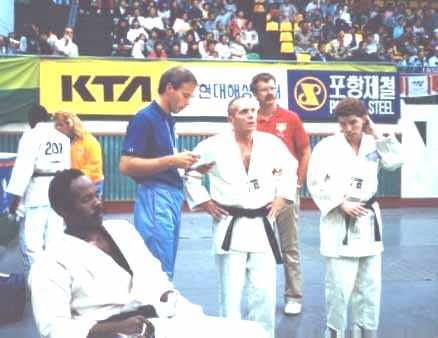Encino Judo Club Alliance with Braille Institute Builds Masteryby Traci Mack (Los Angeles Times, March 2, 2000)Martial Arts MasteryFor more than two decades, the Encino Judo Club has helped teach martial arts skills to blind and visually impaired athletes. It’s important alliance with the Braille Institute Youth Center of Los Angeles has helped hundreds achieve mastery and gain self-confidence. A few have become world champions. One of them is Lynn Manning, who leveraged Judo into a tool for turning his life around, after a shooting that left him blind. The Judo instructor and former title holder credits the sport with offering him a positive outlet for the frustrations tied to being blind in a sighted world. |
Lynn Manning was a talented painter and sculptor when he got involved in a scuffle in a bar and was shot. The bullet passed through one eye and severed the optic nerve in the other, blinding him. Today he remains a standout in the arts, but in a different realm — the martial arts. “Nine months later, I was looking for a way to stay physically active,” recalls Manning of the 1978 incident. “I like working out, but I also liked my beer and beer is still easy to find when you’re blind, whereas exercise is not. Some friends told me about the work the Encino Judo Club was doing. I went to one class, and I was hooked.” Manning, now a former Judo world champion, is just one of hundreds of blind individuals who have trained with the Encino Judo Club. For more than 20 years, the Club has worked with the Braille Institute youth center of Los Angeles to teach the principles of Judo to visually impaired children and adults. “We had a blind student in one of our regular classes, and he eventually became an instructor at the Braille Institute,” said Neil Ohlenkamp, Manning’s Paralympic coach and head instructor at the Encino Judo Club. “He just took the program with him and continued it there.” Those were the beginnings of a successful program that can boast sending five to seven athletes a year into international competition. In fact the Encino Judo Club now serves as the host of the National Training Camp for Visually Impaired Athletes, which will begin instruction for this year’s Paralympic team at the end of this month. The Braille martial arts studio, or Dojo, associated with the Encino Judo Club holds its own tournaments twice a year, which often spur on competitors to compete at higher levels. Classes of about 15 athletes are held twice a week and are split into several ability and age levels, including seniors. Children’s classes focus on beginning skills, such as balance and focus, laying the foundation for future Judo champions. To the casual observer it might be strange that people without vision could prosper in a sport that is based on contact. However, the sport can be taught to anyone – sighted or not. The sport’s founder, Jigoro Kano, intended Judo as a tool to utilize physical and mental strength more effectively, and “to understand the true meaning of life through the mental and physical training of attack and defense.”  The word “Judo” means “gentle way” and that’s the main philosophy the center instills. Although Judo is a martial art it is not based on strength so much as an understanding of one’s limits. “Everybody has difficulty with Judo – it’s not an easy thing to do. But it’s not a sport that relies on sight very much, it’s more about feel and movement, like wrestling,” Ohlenkamp said. “It’s a sport where a blind person can compete equally with someone sighted, which is rare. It gives the blind students a chance to feel capable and confident.” That confidence takes some time to build in the visually impaired, especially for those who were born without sight. People who have been blind since birth have different spatial awareness and orientation. Athletes who have lost their sight usually have less fear of falling and a better sense of balance. Judo also can offer psychological benefits. “The competitive aspect of a contact sport like Judo really gives an outlet to the day-to-day frustrations of being blind in a sighted world,” Manning said. “The sport lends itself wonderfully to the visually impaired. It helps you get from point A to point B with the ability to recover from unseen obstacles.” But the Encino Judo Club goes beyond casual lessons. The club has become a hotbed for blind athletes who wish to compete internationally. The International Blind Sports Association accepted Judo as a Paralympic sport during the mid-’80s, with rules not much different from those for sighted athletes. Instead, the difference is a personal one for visually impaired athletes. The club is filled with stories like Manning’s, stories of confidence rebuilt and new avenues opened. Since taking up Judo, Manning has also gained a position as artist in residence at the prestigious Mark Taper Forum as a playwright, actor and poet. He can also be seen several TV series and movies, most recently, he’s been featured in a recurring role on WB’s “Popular.” Manning admits that the confidence instilled in blind athletes through the Encino Judo Club is a priceless asset to him and others like him. “Judo definitely builds confidence,” says Manning. “Plus, it’s an opportunity to mash somebody good.” |